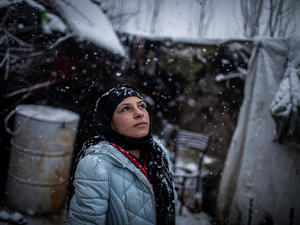UNHCR begins new winter aid drive across Afghanistan
UNHCR begins new winter aid drive across Afghanistan
In the last week UNHCR has begun distribution of winter assistance to nearly quarter of a million people (40,000 families) in remote and inaccessible areas of Afghanistan, as well as in Kabul. The recipients are recent returnees from Pakistan and Iran, internally displaced people - including people displaced by conflict - and others at risk in the cold weather.
Winter temperatures in Afghanistan can fall to around -26°C and for this reason it is important that people are protected from the cold. UNHCR has primary responsibility for delivering winter assistance to returnees and vulnerable displaced people in rural areas of Afghanistan. Last winter, however, and because of difficult conditions in informal sites around Kabul, we also delivered help there. The work is a joint effort coordinated by the Ministry of Refugees and Repatriation, OCHA, and the National Disaster Management Authority.
The relief items going out around the country include tents, blankets, plastic sheets, fuel, sleeping mats, lanterns, jerry cans, kitchen sets, soap and warm clothes. This year, 30,000 of those who will receive winter assistance will be people living in Kabul's informal settlements.
As well as providing help for the vulnerable, the winter distribution serves to mitigate against new displacement from rural communities where alternative support possibilities can otherwise be limited. Nearly 460,000 people have been displaced by conflict in Afghanistan. Most are in the south (137,000 persons), followed by the west (121,527) and east (95,134).
Returned refugees and internally displaced people often live in extremely bad conditions in isolated communities - communities rarely seen by the general public and where access is very difficult. Those receiving our aid include really destitute returnees and IDP groups, families headed by women, or elderly or disabled, and children.
Since 2001, UNHCR has helped around 4.7 million Afghan refugees voluntarily return home. However, nearly three million registered Afghan refugees are still living in exile in Pakistan and Iran.
UNHCR leads Afghanistan's Protection Cluster, co-Chairs the IDP Task Force with the Afghan Ministry of Refugees and Repatriation, and is lead agency for the Emergency Shelter and NFI Cluster.
For further information on this topic, please contact:
- In Kabul, Mohammed Nader Farhad on mobile +93 791 99 0018
- In Geneva, Babar Baloch on mobile +41 79 557 91 06








